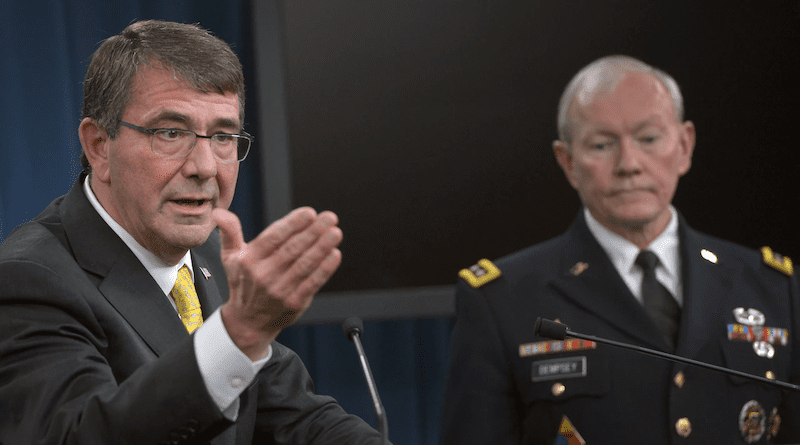Former US Defense Secretary Ash Carter Dies At 68
By DoD News
By Claudette Roulo
Former Defense Secretary Ash Carter died Monday at age 68 after a sudden cardiac event, according to a statement from his family.
Carter “devoted his professional life to the national security of the United States and teaching students about international affairs,” the statement said.
Though trained as a theoretical physicist, Carter’s DOD career was marked by a focus on the tangible, with a special concern on personnel issues and the needs of troops in combat.
He led progress in diversity, equity and inclusion. In January 2016, he opened all military roles to women and increased paid military maternity leave to 12 weeks. Later that year, he authorized transgender service members to join and serve openly.
“We’re talking about talented Americans who are serving with distinction or who want the opportunity to serve,” Carter said in his announcement of the transgender policy. “We can’t allow barriers unrelated to a person’s qualifications [to] prevent us from recruiting and retaining those who can best accomplish the mission.”
In a statement on Carter’s death, Secretary of Defense Lloyd J. Austin III said Carter “understood that the United States was, as he put it, ‘the most important provider of security to the world.’ And he dedicated his long and storied career to fortifying our republic and strengthening what he loved to call ‘the finest fighting force the world has ever known.'”
In his time in the department’s top chair, Carter guided DOD’s renewed focus on the Indo-Pacific region and Russian revanchism and oversaw the commencement of military efforts to defeat ISIS. He established the Defense Innovation Unit-Experimental, a first-of-its kind innovation unit in Silicon Valley that recently marked its 7th anniversary.
Having served in a variety of roles during the Obama administration, Carter was the fifth deputy secretary to become secretary. He was undersecretary of defense for acquisition, technology and logistics from 2009 to 2011; then undersecretary of defense; and, from 2015-2017, the nation’s 25th defense secretary.
“President Obama and I relied on Ash’s fierce intellect and wise counsel to ensure our military’s readiness, technological edge and obligation to the women and men of the greatest fighting force in the history of the world,” President Joe Biden said in his statement.
At his ceremonial swearing-in as defense secretary in 2015, Carter urged the Pentagon to open itself to the more dynamic processes found outside government. “We have to think outside this five-sided box and be open to their best practices, ideas and technologies,” he said.
As deputy secretary, he served as DOD’s chief operating officer and steered its strategy and budget through sequestration. During budget hearings, he described the sequestration process as “sad math” and the “wolf … at the door” of DOD.
Carter served as undersecretary for acquisition, technology and logistics, where he oversaw reformation of the procurement sector and championed innovation. His efforts led to the successful completion of key procurement programs, such as the KC-46 Pegasus tanker aircraft, and the overhaul of the F-35 Lightning II program.
He also led the development, production and delivery of 6,500 mine-resistant ambush-protected vehicles to Afghanistan. This was “an action that saved many lives and gave our troops the confidence that there was someone in Washington who was working for them,” former Sen. Joseph Lieberman said during Carter’s confirmation hearing for the job of defense secretary.
Carter also served under President Bill Clinton from 1993-1996 as assistant secretary of defense for international security policy, where he was responsible for — among other issues — strategic affairs, nuclear weapons policy and the Nunn-Lugar program that removed nuclear weapons from Ukraine, Kazakhstan and Belarus.
His government service began in 1981 as an analyst with the program analysis and evaluation office, now known as the Cost Assessment and program evaluation office.
He held numerous academic positions at Harvard and Stanford universities. He served on the editorial board of the International Security journal from 1990 to 1993. He spent two years working on the Clinton administration’s 1999 North Korea Policy Review as deputy to former Defense Secretary William J. Perry.
Carter was a three-time recipient of the Distinguished Public Service Medal, DOD’s highest civilian award: in 1994 and 1995 as assistant secretary of defense for international security policy and in 2011 as undersecretary of defense for acquisition, technology and logistics. He also received the Defense Intelligence Medal from the Defense Intelligence Agency.
After leaving DOD, Carter returned to Harvard as the director of the Belfer Center for Science and International Affairs.
He is survived by his wife, Stephanie; his son, Will; and his daughter, Ava.

